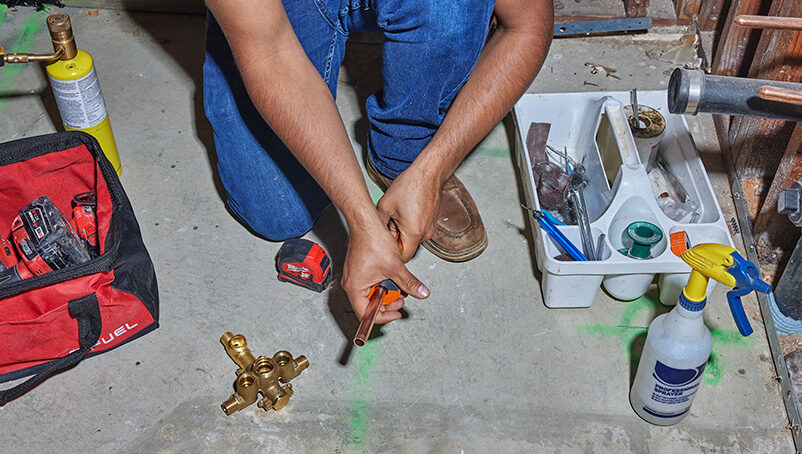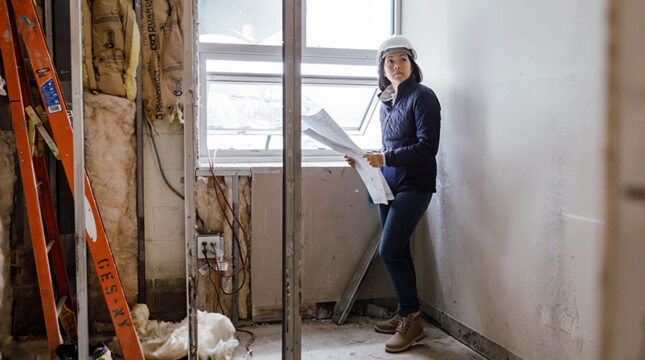Jump ahead to learn about getting your license:
Do you need a license to be a general contractor?
Michigan general contractors must have a Residential Builder license to coordinate the repair, alteration, addition, subtraction or improvement of a residential structure or a combined residential and commercial structure.
Those involved in the following trades for residential construction projects must have a Maintenance and Alteration Contractor license:
- Basement waterproofing
- Carpentry
- Concrete
- Excavation
- Gutters
- House wrecking
- Insulation work
- Masonry
- Roofing
- Screens and storm sash
- Siding
- Swimming pools
- Tile and marble
There is no state-wide licensure requirement for commercial contractors — only local regulations. General contractors involved in commercial construction projects must contact their local county building official to secure any required permits or licenses.
How to get a general contractor license in Michigan
The process is the same whether you’re pursuing a Residential Builder license or a Maintenance and Alteration Contractor license for the first time. You’ll need to fulfill an education requirement and pass a test.
Step 1: Complete the education requirement
You must complete 60 hours of education courses before you can apply for a Michigan general contractor license.
Step 2: Submit your license application
After you’ve completed the education requirement, you can submit your Residential Builder or Maintenance and Alteration Contractor license application.
You must include a nonrefundable $195 license fee and a copy of your pre-licensure certificate.
Step 3: Pass the licensing exam
When your application is approved, the PSI testing company will contact you to schedule your licensing examination. You must take the exam at one of the five PSI testing centers located in the state.
When scheduling your exam, you must pay the exam fee, which is $117 for Residential Builders or $114 for Maintenance and Alteration Contractors.
Michigan contractor license requirements
All applicants must complete 60 hours of approved prelicensure courses. This must include at least six hours in each of the following subject areas:
- Business management, estimating and job costing
- Contracts, liability and risk management
- Design and building science
- Marketing and sales
- Michigan residential code
- MIOSHA construction safety standards
- Project management and scheduling
The remaining 18 hours of prelicensure education may come from other topics on the approved course list.
General contractor license renewal requirements in Michigan
Michigan Residential Builder licenses and Maintenance & Alteration Contractor licenses expire every three years on May 31st. The renewal fee is $150.
You must meet competency requirements to renew your license. During the first six years of licensure, you must complete 21 hours of continuing education in each of the two three-year license cycles. These 21 hours of education must include:
- One hour covering building codes and laws related to the licensed occupation
- One hour covering safety
- One hour covering changes in construction and business management laws
- 18 hours covering other approved topics
After you have been licensed for more than six years, you must complete three hours of continuing education courses during every three-year license cycle. This must include one hour in each of the main topics listed above: building codes and laws, safety and changes in laws.
General contractor license reciprocity
Michigan does not reciprocate with any other states for general contractor licenses. If you wish to verify out-of-state experience to bypass the prelicensing education requirements, you must submit the following along with your application:
- A copy of your current license and the licensing requirements for the governing entity that issued your current license.
- An out-of-state license verification form that the licensing entity has completed.
What kind of insurance does a general contractor need in Michigan?
As a licensed contractor, the right Michigan business insurance can help protect your business. There are several types of general contractor insurance you may want to consider, including:
General Liability insurance
Michigan general liability insurance can help provide coverage for property damage, client injuries and other common work-related accidents that may occur.
Learn more about General Liability for contractors.
Workers’ Compensation insurance
Workers’ compensation insurance can help protect your business if an employee gets hurt on the job. It provides coverage for related expenses, such as wage protection and medical bills.
Learn more about Workers’ Comp for contractors.
Tools and Equipment insurance
Tools and equipment insurance can help protect the gear you use in your job by providing coverage for repairs and replacements if anything is stolen or damaged.
Commercial Auto insurance
Commercial auto insurance can help cover accident-related expenses, such as property damage and medical costs, for contractors who drive for work.
Commercial Property insurance
Commercial property insurance in Michigan can help protect property you rent or own for your business by providing coverage for damage and vandalism.
What is the certificate of insurance requirement?
The state of Michigan does not impose an insurance requirement in order to apply for a Residential Builder license or Maintenance and Alteration Contractor license. However, private employers in this state must carry workers’ compensation insurance if they have one or more employees working 35 hours or more per week or three or more part-time or full-time employees.
How NEXT Insurance supports Michigan general contractors
NEXT offers affordable general contractor insurance with the convenience of online services.
We specialize in helping construction professionals get affordable insurance designed to meet their unique needs.
You can apply for coverage and get a certificate of insurance in just minutes when you use our online services on any computer or mobile device.
Get an instant quote online today.
Are you thinking about becoming a general contractor in another U.S. state? Find out what states require general contractor licenses in our summary of general contractor license requirements.
This information has been provided as a service. It is correct and up-to-date to the best of our knowledge; however, it is in no way intended to offer legal advice and you must always consult with local authorities before you make any business decisions. Regulations and requirements may change at any time.





